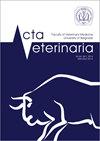The Quality of Life of Allergic Cats, Treated with Allergen-Specific Immunotherapy – A Retrospective Study
IF 0.8
4区 农林科学
Q3 VETERINARY SCIENCES
引用次数: 0
Abstract
Abstract Feline atopic skin syndrome (FASS) describes allergic skin diseases in cats associated with sensitivity to environmental allergens. Allergen-specific immunotherapy (ASIT) aims to reduce or eliminate symptoms associated with subsequent exposure to the causative allergen. The primary outcome of this study was to determine if the quality of life (QoL) of cats and owners improved as a result of ASIT. The secondary outcome was to determine whether the QoL improved in cats treated with ASIT compared with cats treated symptomatically. Eight cats were included in the ASIT group (AG) and 6 cats in the control group (CG). Validated quality of life questionnaires were retrospectively completed by cat owners for the period before and after treatment. The QoL of cats improved significantly with ASIT. Cats were significantly less lazy, nervous, aggressive, restrained, preened less while sleeping and hid less, were less disturbed by consultations, were more playful and interactive with their environment, and had better appetites than before treatment. Owners felt significantly less physically exhausted and less emotionally distressed compared to before ASIT treatment and their expenses were significantly lower. On the contrary various symptomatic treatments did not significantly improve the quality of life of the cats or their owners in any of the terms. No serious side effects were observed with ASIT. The quality of life of animals suffering from chronic diseases is important as it determines the decisions of owners and veterinarians on the modalities of lifelong treatment. Validated questionnaires are still rarely used in veterinary practice and research.用过敏原特异性免疫疗法治疗过敏猫的生活质量——一项回顾性研究
摘要猫特应性皮肤综合征(FASS)描述了猫对环境过敏原敏感的过敏性皮肤病。过敏原特异性免疫疗法(ASIT)旨在减少或消除与随后接触致敏原相关的症状。这项研究的主要结果是确定猫和主人的生活质量(QoL)是否因ASIT而改善。次要结果是确定接受ASIT治疗的猫与有症状治疗的猫相比生活质量是否有所改善。ASIT组(AG)包括8只猫,对照组(CG)包括6只猫。猫主人在治疗前后回顾性地完成了经过验证的生活质量问卷。ASIT使猫的生活质量显著改善。猫明显不那么懒惰、紧张、好斗、克制,睡觉时梳理得更少,藏得更少,更少受到咨询的干扰,更喜欢玩耍和与环境互动,食欲也比治疗前更好。与ASIT治疗前相比,患者的体力消耗和情绪痛苦明显减轻,费用也明显降低。相反,各种症状治疗并没有显著改善猫或其主人的生活质量。ASIT未观察到严重副作用。患有慢性病的动物的生活质量很重要,因为它决定了主人和兽医对终身治疗方式的决定。经过验证的问卷在兽医实践和研究中仍然很少使用。
本文章由计算机程序翻译,如有差异,请以英文原文为准。
求助全文
约1分钟内获得全文
求助全文
来源期刊

Acta Veterinaria-Beograd
农林科学-兽医学
CiteScore
1.30
自引率
16.70%
发文量
33
审稿时长
18-36 weeks
期刊介绍:
The Acta Veterinaria is an open access, peer-reviewed scientific journal of the Faculty of Veterinary Medicine, University of Belgrade, Serbia, dedicated to the publication of original research articles, invited review articles, and to limited extent methodology articles and case reports. The journal considers articles on all aspects of veterinary science and medicine, including the diagnosis, prevention and treatment of medical conditions of domestic, companion, farm and wild animals, as well as the biomedical processes that underlie their health.
 求助内容:
求助内容: 应助结果提醒方式:
应助结果提醒方式:


